Jinhua Chen is Professor of East Asian intellectual history (particularly religions) at the University of British Columbia, where he also served as the Canada Research Chair in East Asian Buddhism (2001–2011). He has additionally taught short-term positions at the University of Virginia, the University of Tokyo, and Stanford University.As recipient of research grants and fellowships including Social Sciences and Humanities Research Council of Canada (SSHRC), Canada Research Chairs (CRC) Program, Killam Foundation, Peter Wall Institute for the Advanced Studies, Society for the Promotion of Buddhism (Bukkyō Dendō Kyōkai, BDK), Japan Society for the Promotion of Social Sciences (JSPS), Alexander von Humboldt Foundation and the Max Plank Institute, the Academy of Korean Studies, and most recently, the National Humanities Center, his research projects span from East Asian state-church relationships, to monastic (hagio/)biographical literature, Buddhist sacred sites, relic veneration, Buddhism and technological innovation in medieval China, and Buddhist translations. In addition to publishing six monographs, he has also co-edited thirteen books. He has authored over seventy book chapters and journal articles. See more information on his current and forthcoming publications here.
Click here to return to the main conference page.
| CHEN Jinhua 陳金華 (UBC 加拿大英屬哥倫比亞大學) 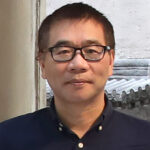 |
|
| Imre GALAMBOS (University of Cambridge 劍橋大學)  |
Imre Galambos is a specialist of medieval Chinese manuscripts. He received his PhD in 2002 from UC Berkeley with a dissertation on the variability of Chinese characters in pre-Qin manuscripts. After graduation, he worked at the International Dunhuang Project (IDP) at the British Library for ten years, before moving on in 2012 to teach pre-modern Chinese language and history at the University of Cambridge. His current research primarily focuses on codicology, palaeography and manuscript studies in general, as well as the linguistic interaction between various cultures in East and Central Asia. His books include Orthography of Early Chinese Writing (2006); Manuscripts and Travellers (2012, co-authored with Sam van Schaik); and Translating Chinese Tradition and Teaching Tangut Culture (2015). His new book Chinese Manuscripts from Ninth-Tenth Century Dunhuang is scheduled to come out later this year. |
| Qingsheng HUANG 慶聖 (Temple University 天普大學) 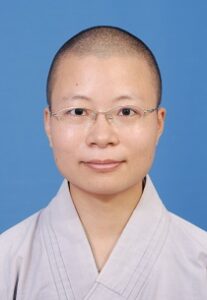 |
Qingsheng HUANG 慶聖 is a PhD student in the Department of Religion at Temple University. She obtained a BA from Nanjing University and a MA in Economics from Peking University before going forth into the monastic life in 2013. In 2019 she graduated from Hangzhou Buddhist Academy. Her main research interests cover the transmission of Sarvārstivāda Abhidharma texts in China, as well as the connection and tension between different vows in monastic practice. |
| JI Aimin 季愛民 (Northeast Normal University 東北師範大學) 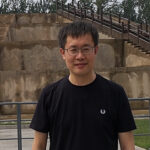 |
季愛民,東北師範大學歷史文化學院教授,從事隋唐史和佛教社會史研究。2010年以來,致力於隋唐兩京地區佛教銘文資料的搜集與整理工作,近年集中於唐兩京地區禪社會史的研究。2013年9月至2014年9月在佛吉尼亞大學訪學。已經出版《隋唐長安佛教社會史》(中華書局,2016年),發表《盛唐士人的道德自覺與禪傳播的關係》(《世界宗教研究》2017年5期)等論文。 |
| JI Yun 紀贇 (Buddhist College of Singapore 新加坡佛學院) 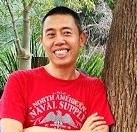 |
Ji Yun received his Ph.D. from Fudan University, Shanghai, in 2006. During the writing of his doctorate dissertation, his research encompassed the study of Buddhism within the philological studies of Buddhist written texts, the collecting of biographical materials of monks, and the anthropological studies of religion. Eventually, his dissertation, ‘Huijiao Gaoseng zhuan yanjiu’ 慧皎《高僧傳》研究 [A Study on the Biographies of Eminent Monks written by Huijiao] was published in early 2009. As a full-time lecturer of BCS, Ji Yun is now engaged in teaching subjects such as Buddhist Literature, the institution of Buddhist Sangha, and Chinese and Indic languages. Ji Yun also assists in overseeing the operation of the college’s Academic Office and the library. |
| LEI Wen 雷聞 (Chinese Academy of Social Sciences 中國社會科學院) 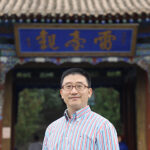 |
雷聞,1972年生,男,陝西旬陽人,北京大學歷史學博士(2002年)。現為中國社會科學院古代史研究所研究員,兼任隋唐五代十國史研究室主任、中國社會科學院敦煌學研究中心主任,《隋唐遼宋金元史論叢》主編。主要研究方向包括:隋唐制度史、宗教史、敦煌吐魯番學。曾參與寧波天一閣藏明鈔本《天聖令》及新獲吐魯番文書的整理與研究。在《歷史研究》、《中國史研究》、《唐研究》等期刊發表論文六十餘篇。代表作《郊廟之外——隋唐國家祭祀與宗教》(三聯書店,2009年5月)曾獲第六屆“胡繩青年學術獎”(2012年)。曾多次赴英國、美國、日本、臺灣等地訪問、講學,為2007-2008年度美國哈佛燕京學社訪問學者。目前的主要課題是唐代道教金石文獻的整理與研究,以及唐代的官文書與政務運行。 |
| LÜ Bo 呂博 (Wuhan University 武漢大學) 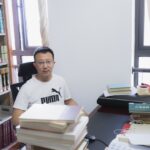 |
吕博,男,1987年1月生,陕西延安人,武汉大学历史学院暨中国三至九世纪研究所副教授。2014年毕业于武汉大学历史学院,获历史学博士学位。2012年至2013年在日本京都大学人间环境学研究科访学。2014年至2016年任武汉大学历史学院考古系博士后。2019年4月25日-2020年4月25日担任东京大学人文社会系研究科外国人研究员。主要研究方向为隋唐礼仪实践与政治变迁、吐鲁番文书等。近年发表论文《头饰背后的政治史:从“武家诸王样”到“山子军容头”》《明堂建设与武周的皇帝像》《《唐西州前庭府卫士左憧憙的一生》等。 |
| D. Max MOERMAN (Columbia University 哥倫比亞大學)  |
D. Max Moerman is Professor in the Department of Asian and Middle Eastern Cultures at Barnard College, Columbia University and Co-Chair of the Columbia University Seminar in Buddhist Studies. His research interests lie in the visual and material culture of premodern Japanese Buddhism. Moerman’s publications have examined such topics as the representation of pilgrimage landscapes in painting, literature, and ritual; the burial of sutras and Buddhist images; the death of the Buddha in medieval painting and the print culture of the Edo period; islands of women in the history of Japanese maps; narrative and iconographic traditions of lepers and hot springs; Buddhist cartography and cosmography; and religious oaths inscribed on Japanese talismans. He is the author of Localizing Paradise: Kumano Pilgrimage and the Religious Culture of Premodern Japan (Harvard University Asia Center, 2005) and The Japanese Buddhist World Map: Religious Vision and the Cartographic Imagination (University of Hawaii Press, forthcoming). Moerman received his PhD from Stanford University in 1999. |
| N. Harry ROTHSCHILD (University of Northern Florida 北佛羅里達大學)  |
For twenty years, the focus of Dr. Rothschild’s research is Wu Zhao (624-705), better known as Wu Zetian or Empress Wu. His most recent book Emperor Wu Zhao and her Pantheon of Devis, Divinities, and Dynastic Mothers (Columbia University Press, 2015) examines the female emperor’s sustained effort to deploy language, symbol, and ideology to harness the cultural resonance, maternal force, divine energy, and historical weight of a broad-base of female exemplars and divinities—Buddhist devis, Confucian exemplars, Daoist immortals, and mythic goddesses—to establish cultural, religious, and political legitimacy. Tapping into powerful subterranean reservoirs of female power, Wu Zhao built a pantheon of female divinities carefully calibrated to meet her needs at court. This pageant of goddesses and eminent women was promoted in scripted rhetoric, reinforced through poetry, celebrated in theatrical productions, and inscribed on steles. This work follows his first book, a biography of the female ruler titled Wu Zhao, China’s Only Female Emperor (Longman World Biography Series, 2008). In addition, he has published an array of more than a dozen essays analyzing various facets of Wu Zhao’s sovereignty—her connection to apocalyptic Buddhism, her utilization of avian symbolism, her deft manipulation of language in choosing reign names, and the significance of her rapport with non-Chinese subjects—in Canadian, Italian, Korean, Chinese and American journals. Recent essays have also examined other epiphenomena in early Tang history: one examines contested narratives of the environmental and political consequences of a locust infestation in 715-6 and another looks at escalating rhetoric opposing performances of a Sogdian dramas in the early eighth century after Wu Zhao’s ouster and death. |
| Marta SANVIDO (Ca’ Foscari University of Venice 威尼斯卡奧斯卡大學)  |
Marta Sanvido is an adjunct professor in Japanese Language and Culture at Ca’Foscari University of Venice. She earned a Ph.D. in Japanese religions from the same university in 2019. Sanvido’s research interests lie in the intersection of different types of knowledge emerging from Zen medieval secret textual corpus. Her doctoral thesis explores the two interconnected rubrics of secrecy and the combinatory character of premodern religiosity that manifest in secret manuals (monsanand kirigami) from Sōtō school, offering a new hermeneutical perspective based on the theory of the Five Positions (Goi 五位).
During her doctoral years, Dr. Sanvido conducted a two-year extensive fieldwork in Japanese temples and archives with the generous support of the Ca’Foscari International Bursary and Japan Foundation Doctoral Fellowship. She is currently working on two academic papers and a book project based on her doctoral dissertation. Dr. Sanvido is also interested in the role of forged documents and the rhetoric underlying the creation of Buddhist actors’ sphere of influence during the medieval years. |
| Morten SCHLÜTTER (University of Iowa 愛荷華大學)  |
Morten Schlütter (PhD, Yale University) is Associate Professor and Chair of the Department of Religious Studies at the University of Iowa, and the former Director of the University of Iowa Center for Asian and Pacific Studies. He is the author of How Zen Became Zen: The Dispute over Enlightenment and the Formation of Chan Buddhism in Song-Dynasty China (University of Hawai’i Press, 2008), that focuses on crucial developments within Chan [Jpn.: Zen] Buddhism that came to dominate Chinese monastic Buddhism by the tenth century. He is the co-editor of Readings of the Platform Sūtra (Columbia University Press, 2012), and the author of many articles on Chinese Buddhism and Chan. He is currently at work on a book manuscript that traces the evolution of Chinese Chan through different versions of the Platform Sūtra. He is also working on a long-term project concerned with how Buddhist monastic communities in Southern-Song China (1127-1279) interacted with secular elite society. |
| Neil SCHMID (Dunhuang Academy 敦煌研究院)  |
Neil Schmid is Research Professor at the Dunhuang Academy in the Centre for Silk Road and Dunhuang Comparative Research. His research centers on Dunhuang and covers variety of topics: the role of Buddhist literature in ritual and art, medieval economic development, esoteric Buddhism, and transcultural flow of religious objects and ideas across northern Asia. Neil is currently working on several book-length projects, among them a monograph entitled From Byzantium to Japan: Ritual Objects and Religious Exchanges Across Eurasia in Late Antiquity, and A Comprehensive Guide to Scholarly Resources for Dunhuang Studies 國際敦煌學學術資源全集 in English and Chinese. |
| SHEN Ruiwen 沈睿文 (Peking U 北京大學) 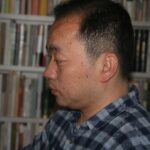 |
沈睿文,历史学博士,北京大学考古文博学院教授,从事汉唐考古的教学与科研。研究涉及陵墓制度、丧葬习俗、宗教、美术、中外文化交流考古以及中古城邑等领域。
已出版《唐陵的布局:空间与秩序》(北京大学出版社,2009)、《安禄山服散考》(上海古籍出版社,2015;修订本2016)、《中国古代物质文化史·隋唐五代》(开明出版社,2015)、《中古中国祆教信仰与丧葬》(上海古籍出版社,2019)、以及《都兰吐蕃墓》(科学出版社,2005,合著)等专著,主编3部。 |
| SHEN Weirong 沈衛榮 (Tsing-hua University 清華大學)  |
沈衛榮德國波恩大學中亞語言文化學博士,歷任哈佛大學印度梵文研究系合作研究員、德國洪堡大學中亞系代理教授、日本京都大學文學部外國人共同研究員、台灣中央研究院歷史語言研究所客座教授、普林斯頓高等研究院2012/2013年度研究員、德國柏林高等研究院2014/2015年度研究員等職。曾任中國人民大學國學院教授、西域歷史語言研究所所長、漢藏佛學研究中心主任。現任清華大學人文社會科學高等研究所、清華大學中文系教授。專門研究領域:西域語文、歷史,特別是西藏歷史、藏傳佛教和漢藏佛學的比較研究。 |
| SHENG Kai 聖凱 (Tsing-hua University 清華大學) 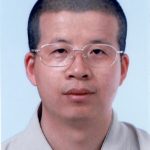 |
Ven. Dr. Sheng Kai is a Professor in the Philosophy Department of Tsinghua University, the Executive director of the Buddhist Association of China, and a Graduate Teacher of Buddhist Academy of Putuo Mount, Zhejiang Province. In 2008, he was the Associate professor of Philosophy Department of Nanjing University. He studied in the Buddhist Academy of China, Nanjing University, attained MPhil (Nanjing University) in 2002, PhD (Nanjing University) in 2005, and finished Postdoctoral study in Tsinghua University in 2007. He is the author of following books: (1.)The Buddhist Ritual of China, (2) Study on the Confessional Ritual of Chinese Buddhism, (3) The Buddhist Confessional Thought, (4) Study on the School of Mahayana-samuparigraha-sastra. He specializes in Buddhist Confession, Buddhist Pure Land Thought, Yogacara Buddism and Tathagatagarbha Buddhism. |
| Eugene WANG (Harvard University 哈佛大學) 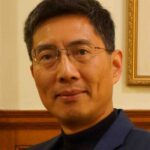 |
Eugene Wang (Ph.D Harvard, 1997) began teaching at the University of Chicago in 1996 before joining the faculty at Harvard University in 1997. He was appointed the Abby Aldrich Rockefeller Professor of Asian Art at Harvard in 2005. A Guggenheim Fellow (2005) and recipient of ACLS and Getty grants, he served as the art history associate editor of the Encyclopedia of Buddhism (Macmillan, 2004). His book, Shaping the Lotus Sutra: Buddhist Visual Culture of Medieval China (2005) received the Academic Excellence Award from Japan in 2006. His extensive publications cover the entire range of Chinese art history from ancient funerary art to modern and contemporary Chinese art and cinema. He serves on the advisory board of the Center for Advanced Studies, National Gallery of Art in Washington D.C. and the editorial board of The Art Bulletin. |
| WANG Jing 王靜 (Renmin University of China 中國人民大學) 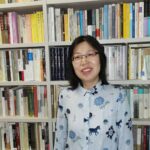 |
王 靜, 山東煙台人,歷史學博士,現任中國人民大學歷史學院副教授。主要從事隋唐五代史、中國古代都市社會史方面的研究與教學,已出版《中古都城建城傳說與政治文化》(社會科學文獻出版社,2013年)與論文若干。 |
| Michelle C WANG 王慧兰 (Georgetown University 喬治敦大學) 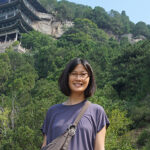 |
Michelle C. Wang 王慧兰 is Associate Professor in the Department of Art and Art History at Georgetown University. A specialist in medieval Chinese art, her publications have addressed Buddhist maṇḍalas, Dunhuang painting, and art of the Silk Road. Her first monograph, Maṇḍalas in the Making: The Visual Culture of Esoteric Buddhism at Dunhuang (Leiden and Boston: Brill, 2018) analyzes the Maṇḍala of Eight Great Bodhisattvas at the Mogao and Yulin caves during the Tibetan and Guiyijun periods, demonstrating that transcultural communication over the Silk Routes, and the religious dialogue between Chinese and Tibetan communities, were defining characteristics of Buddhist maṇḍalas at Dunhuang. |
| Dorothy WONG (University of Virginia 弗吉尼亞大學) 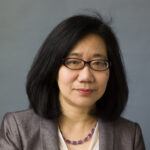 |
Dorothy Wong is currently Professor of Art and Director of the East Asia Center at the University of Virginia. Specializing in Buddhist art of medieval China, Dorothy Wong’s research addresses topics of art in relation to religion and society, and of the relationship between religious texts/doctrine and visual representations. She has published Chinese Steles: Pre-Buddhist and Buddhist Use of a Symbolic Form (2004; Chinese edition 2011), Hōryūji Reconsidered (editor and contributing author, 2008) China and Beyond in the Medieaval Period: Cultural Crossings and Inter-regional Connections (co-editor with Gustav Heldt, and contributing author, 2014), and Buddhist Pilgrim-Monks as Agents of Cultural and Artistic Transmission: The International Buddhist Art Style in East Asia, ca. 645–770 (2018). In addition to publishing numerous articles and book chapters, she is also preparing an edited volume on Miraculous Images in Asian Traditions, to be published as volume 50 of the journal Ars Orientalis in 2020. |
| WU Jiang (University of Arizona 亞利桑那大學) 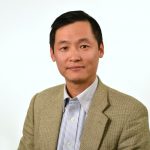 |
Jiang Wu is currently a professor in Department of East Asian Studies at the University of Arizona (Tucson). He received his Masters degree from Nankai University (1994) and Ph.D. from Harvard University (2002). His research interests include seventeenth-century Chinese Buddhism, especially Chan/Zen Buddhism, the role of Buddhist canons in the formation of East Asian Buddhist culture, and the historical exchanges between Chinese Buddhism and Japanese Buddhism. Other interests include Confucianism, Chinese intellectual history and social history, and the application of electronic cultural atlas tools in the study of Chinese culture and religion. He has published articles in Asia Major, Journal of East Asian History, Journal of Chinese Philosophy, and Monumenta Serica on a variety of topics. His first bookEnlightenment in Dispute: The Reinvention of Chan Buddhism in Seventeenth-century China has been published by Oxford University Press in 2008. Right now, he is conducting research on the formation of the Jiaxing canon in late imperial China and writing a biography of Yinyuan Longqi. |
| XIE Yifeng 谢一峰 (Hunan 湖南大學/ CamLab at Harvard 哈佛中國藝術實驗室) 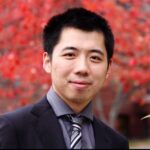 |
Xie Yifeng, an associate professor in Yuelu Academy, Hunan University. He got the B. A. from the historical culture college of Sichuan University in 2010 and graduated from the history department of Zhejiang University to get the M. A in 2012. In 2017, he got the Ph. D. from the National Institute for Advanced Humanistic Studies, supervised by Prof. Ge Zhaoguang, and his mainly academic concern is religion, art and history in Asia. From 2014 to 2016, he was the visiting fellow of Harvard Yenching Institute to cooperate with Prof. James Robson. In 2019, he became the visiting scholar of Chinese Art Media Lab, supported by CSC and to cooperate with Prof. Eugene Wang. On academic publications, he published more than twenty papers in Wenshi, Shilin, Dushu, Songshi Yanjiu Luncong, Tangshi Luncong, Zhongguo Shehui Lishi Pinglun, Hanxue Yanjiu, Ershiyi Shiji and Daojiao Yanjiu Xuebao etc.; and translated the essays collection of Prof. Stephen Bokenkamp with three other scholars in 2014. |
| YU Xin 余欣 (Fudan University 復旦大學) 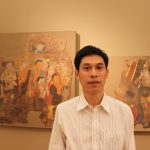 |
Yu Xin is a historian of medieval China and Silk Road, specializing in the study of Dunhuang manuscripts and the Tang dynasty. He received his BA (1997) and MA (2000) from Zhejiang University, and Ph. D (2003) in Chinese History from Peking University. He joined Fudan University in 2003 and now is Professor of Medieval Chinese History. He has held appointments as visiting professor at École des hautes études en sciences sociales, École normale supérieure, Princeton University, Kyoto University, and The Starr Foundation East Asian Studies Endowment Fund Member at the Institute for Advanced Study.Professor Yu’s research interests lie in natural history, manuscript culture, and the social history of religion. He aims to develop a comprehensive understanding of the role of different source materials (historical records, archaeological evidence, bamboo slips and silk texts, Dunhuang and Turfan manuscripts, lost Chinese books in Japan, and literature on Sino-foreign relations) in the production of knowledge and religious practice, and to re-think the role of manuscripts and images in intellectual history, belief, and daily life. He has published numerous books, including Way of Gods, Life of Humans: Social History of Livelihood Religions in Dunhuang during the Tang and Song Dynasties(2006); Signs of the Extraordinary in Medieval China: Erudition, Belief, and Society in the Age of Manuscripts (2011). He is also the chief editor of a series of research monographs: Studies of Knowledge, Faith, and Institutions in Medieval China (12 published to date, and 6 projected in the future, 2012-) as well as the bilingual academic journal Medieval China 中古中國研究. |
| Shuheng (Diana) ZHANG 張舒姮 (University of Pennsylvania 賓夕法尼亞大學) 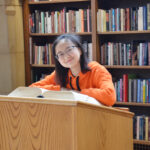 |
Shuheng (Diana) ZHANG (張舒姮) is a PhD student at the University of Pennsylvania, focusing on philology, Dunhuang manuscript studies, and early-to-medieval history of Indo-Iranian-Sinitic textual and linguistic contact along the Silk Road. Zhang is particularly interested in examining the ways in which medieval Chinese intellectuals reflected upon and understood features of their own language when introduced to the rich Indic philological traditions, and how the adoption of foreign lexicon and literary practices facilitate the exchange of ideas in light of new philological techniques they encountered during their interaction with Indic counterparts. Zhang is also interested in historical linguistics, especially proto-dialectology. |
| ZHANG Naizhu 張乃翥 (Institute of Longmen Grottos 龍門研究院) 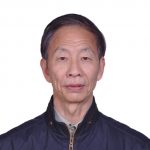 |
張乃翥,1981年洛陽大學中文系畢業,於龍門石窟研究院從事文化遺產的學術研究至今,副研究員。中國考古學會會員,中國魏晉南北朝史學會會員,中國唐史學會會員,中國海外交通史學會會員,中國敦煌吐魯番學會理事。絲綢之路沿線的文化交流和西域文明的東方傳播,是其幾十年來學術研究的重點方向。 30多年來在海內外發表學術論文百餘篇,出版學術著作13部。曾應邀赴新加坡、韓國、意大利、奧地利、俄羅斯進行國際學術交流和講學。並訪問印度、斯里蘭卡及歐洲諸國的眾多文化遺產和博物館。目前正在從事的學術著述,是《隋唐洛陽佛教寺院史料集成》,業已完成220萬字的史料輯錄。 |
| ZHANG Xiaoyan 張小豔 (Fudan University 復旦大學)  |
Zhang Xiaoyan is currently a professor in Center for Research on Chinese Excavated Classics and Paleography of Fudan University. She received her Ph.D.(Chinese Classical Philology) from Chinese Classics Research Institute of Zhejiang University(2004). Her research focuses on the area of Dunhuang Manuscripts and early modern Chinese language.She is the author of Research on the Language of Shuyi Texts from Dunhuang Manuscripts (The Commercial Press, 2007) and Research of the words in Dunhuang manuscripts concerning Social and Economic History (Shanghai People’s Publishing House, 2013). She has published more than 60 articles. Her doctoral dissertation was awarded as One-hundred National Excellent Doctoral Dissertations in China (2006). |
